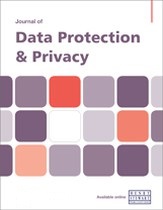Teleology: The missing piece to solving the GDPR puzzle
Abstract
The Court of Justice of the European Union (CJEU) plays an essential role as the supreme interpreter of primary and secondary European law. Since its inception, the CJEU adopted four methods of interpretation — grammatical, contextual, historical and teleological — and often used all of them to clarify a provision in question. For many reasons, the teleological method is often avoided or misunderstood by many. Regardless of personal opinions, however, the teleological method’s significant impact on the legal interpretation of European Union (EU) legislation must be acknowledged. Rightly or not, the majority of interested parties perceive the provisions of the General Data Protection Regulation (GDPR) as ambiguous. The EU’s 24 official languages hinder the use of the grammatical method of interpretation as the primary and absolute one. The contextual and historical methods are often inconclusive. Consequently, the teleological method of legal interpretation, focusing on the goals and objectives of the legislation, allows the CJEU to adjudicate coherently with the whole EU legal system and its objectives. Recognising that the goals and objectives are part of the GDPR complements the grammatical, contextual and historical interpretation methods and help see the regulation in its intended light: a legal framework for personal data processing, which respects everyone’s fundamental right to personal data protection, aiming to balance it with other fundamental rights. This paper aims to draw attention to the often forgotten or only reluctantly applied teleological interpretation method in implementing the GDPR.
The full article is available to subscribers to the journal.
Author's Biography
Paweł Kuch is an attorney-at-law and PhD candidate in the Faculty of Law at the University of Zurich. A former fellow at Mannheim University, he holds Master’s degrees in marketing and management and law from Adam Mickiewicz University. His research interests focus on technology law and data protection; current topics include legal issues of trans-humanism — the Internet of Bodies (IoB), chip implants, biotechnology and bionics — and liability regime of artificial intelligence (AI) and quantum computing. Pawel’s other academic papers on the Court of Justice of the European Union jurisdiction and intra-European migration provide different perspectives on the ongoing discussion on the European Union’s necessary reforms. Combining academic research with legal practice, Paweł aims to offer a practical approach to theoretical research deliberations.
